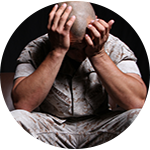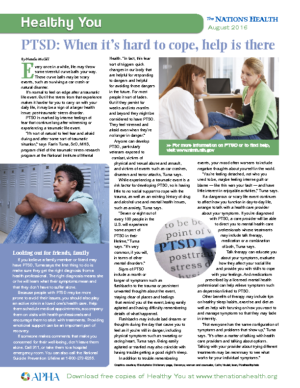
Every once in a while, life may throw some stressful curve balls your way. Those curve balls may be scary events, such as surviving a car crash or natural disaster. PTSD is marked by intense feelings of fear that continue long after witnessing or experiencing a traumatic life event.
“While experiencing a traumatic event is a risk factor for developing PTSD, so is having little to no social support to cope with the trauma, as well as an existing history of drug and alcohol use and mental health issues, such as anxiety,” says Farris Tuma, ScD, MHS, program chief of the traumatic stress research program at the National Institute of Mental Health.
 “Post-traumatic stress disorder is very common. Seven or eight out of every 100 people in the United States will experience some aspect of PTSD in their lifetime.”
“Post-traumatic stress disorder is very common. Seven or eight out of every 100 people in the United States will experience some aspect of PTSD in their lifetime.”
Signs of PTSD include a month or longer of symptoms such as flashbacks to the trauma or persistent unwanted thoughts about the event, staying clear of places and feelings that remind you of the event, being easily agitated and having difficulty remembering details of what happened. In addition to trouble remembering events, your mood often worsens to include negative thoughts about yourself in the world.
If a dangerous or scary life event continues to affect how you function in day-to-day life, arrange to talk with a health care provider about your symptoms. If you’re diagnosed with PTSD, a care provider will be able to direct you to mental health care professionals whose treatments may include talk therapy, medication or a combination of both, Tuma says.
Looking Out for Family and Friends
If you believe a family member or friend may have PTSD, Tuma says the first thing to do is make sure they get the right diagnosis from a health professional. The right diagnosis means she or he will learn what their symptoms mean and that they don’t have to suffer alone.
Because people with PTSD may be more prone to avoid their issues, you should also play an active role in a loved one’s health care. Help them schedule medical appointments, accompany them on visits with health professionals and encourage them to stick with treatments. Providing emotional support can be an important part of recovery.
Care Matters specializes in helping people to address, manage, and overcome problems with post-traumatic stress disorder. If you or someone you know may be suffering from PTSD, you can contact us by calling 248-691-9034 or by sending an e-mail to mycare@caremattersllc.com.

